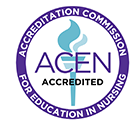Assess, diagnose and plan for the health needs of all adults – from adolescents to seniors.
Gerontology is the study of the aging processes and persons transitioning to later life stages. This field is not to be confused with that of geriatrics, which is the study of health and disease in elderly people. Adult gerontology – primary care nurse practitioners (AGPCNPs or otherwise known as AGNPs) provide primary care to adults, including geriatric patients, and help them manage or overcome various conditions and illnesses.
In addition to the treatment of chronic illnesses, AGPCNPs are often well experienced in polypharmacy management, palliative care, and the provision of services that involve end-of-life considerations. With a primary care focus on patient wellness and promoting healthy choices, AGPCNPs may also manage transitions between care settings and often provide caregiver education and evaluation. Many AGPCNPs work in long-term care settings and clinics throughout the community or may have their own private practice.
AGPCNPs are in demand
The National Center for Workforce Analysis (NCHWA) reported an estimated 20,000 primary care physician shortfall by 2025. Owing to their advanced nursing education, elevated skills, and added autonomy in their practice, adult-gerontology primary care nurse practitioners (AGPCNPs) are well-positioned to help fill this growing void. Able to deliver primary care services to a wide range of patients – from adolescents to elderly adults, APCPNPs will continue to be in high demand across the nation as the population continues to grow and as the baby boomer generation continues to age.
AGPCNP responsibilities include:
- Performing physical examinations
- Ordering screening tests
- Interpreting diagnostic tests
- Diagnosing and treating common acute health care problems
- Administering pharmacological and nonpharmacological therapies
- Developing implementing disease prevention and healthy lifestyle plans
- Evaluating the effectiveness of a patient’s treatment plan
- One-on-one health counseling and education
- Coordinating with specialty physicians and other health care providers as needed
Common practice settings include:
- House call practices
- College health centers
- Specialty clinics, such as rheumatology, cardiology, and pulmonary
- Hospices
- Palliative care facilities
- Hospital outpatient clinics
- Rehabilitation centers
- Correctional institutes
- Educational institutions
- Military organizations
Did You Know?*
- The top practice settings for AGPCNPs are hospital outpatient clinics, hospital inpatient units and private group practices.
- The top diagnoses that AGPCNPs treat are anxiety, abdominal pain and hypertension.
- The top clinical focus areas for AGPCNPs are primary care, geriatrics and oncology/hematology.
*AANP

Regis College is accredited by the New England Commission of Higher Education

Accredited by the Accreditation Commission for Education in Nursing (ACEN)

Designated as a Center of Excellence in Nursing Education by the National League for Nursing 2008-2020

Master’s Programs Guide ranked Regis #16 in 50 Best Online Master of Science in Nursing Programs.

